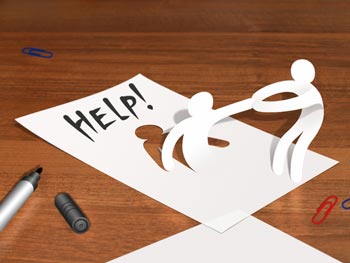I often receive requests from people who are seeking writing help. Some are seeking professional services; they want someone to edit a book they’ve written or coach them through the process of writing a novel. Other times, I get questions about writing that range from simple to complicated. One person might send me a sentence and ask if it’s grammatically correct; another will ask what they should do to become a rich and famous author.
We all need a little help every now and then, and there’s nothing wrong with asking questions or seeking advice. But to get the right kind of writing help, it makes sense to start by understanding what kind of help you need.
It also makes sense to seek help in the right places and from the right people. Too many times, I’ve seen people dishing out grammar tips and writing advice that were just plain wrong. For example, I’ve seen people say that using the serial comma is correct all the time, and I’ve seen people saying you should never use it. They are both wrong; it’s a style issue, not a grammar issue, which means it’s not a matter of correctness. There is no right or wrong answer.
On several occasions, people have left comments or sent emails to let me know I’d made a grammatical mistake on a blog post. This causes my heart rate to speed up, and I quickly check my text. There have been occasions when a thoughtful reader has helped me catch a typo — but there have been other occasions when I’ve taken time to check my work and double check my trusty resources only to find that my original text was correct and the person who was trying to make a correction was wrong.
I think most people have good intentions and are only sharing with others whatever they were taught. But these situations demonstrate why it’s important to know what kind of writing help you need and then get that help from a reliable source.
Before Seeking Writing Help
Before you reach out and ask for writing help, there are a few things you can do to make sure you get the help you need:
1. Identify your problem.
It’s difficult to get help if you’re not sure what kind of help you need. Sometimes you’ll realize that you don’t need help at all. For example, if you’re trying to decide whether your main character is tall or short, that’s not something you need help with. You just need to consider the needs of the story you want to tell and make your own decision. On the other hand, if you’re running into difficulty at every twist and turn in your story and are finding it impossible to make decisions because you’re not sure what the story needs, then maybe a developmental editor or writing coach will be able to help you.
2. Try to find the answer on your own.
If you have a simple question about whether a word should be capitalized or where a comma should be placed, try looking it up before asking around. This is a good and necessary habit for any writer. You’re going to have lots of questions as your writing progresses, and it’s best to become self-reliant and use the resources that are available to you, like dictionaries, encyclopedias, and grammar or style guides. When you put a little effort into finding answers on your own, you’re more likely to learn from the experience and the question is less likely to arise again in the future.
3. Check to make sure the resources you’re using are reliable.
Use resources wisely — especially online; make sure you check the credibility of any website you’re getting technical answers from. Anyone can publish information on a website, which may or may not be correct. Look for sources that are based on solid references. An even better solution is to build your own library of references, so you will always have accurate and reliable answers at your fingertips. For recommendations, check the writing resources section here at Writing Forward.
4. Make sure the experts you consult with and hire are credible.
There are many levels of editing and many levels of editors. Everybody starts somewhere, and you need to determine whether you want to hire a beginning editor who doesn’t have formal training and experience or a seasoned editor with formal training and experience. As with websites that publish faulty information, anyone can offer editing services. When looking for writing help from professionals, you’ll want to take their expertise and your budget into consideration.
Pause and Ponder Before Seeking Writing Help
Before going on your quest to get help with your writing, take a moment and make sure you know exactly what kind of help you need. Is it a problem you can solve for yourself? Do you need to consult an expert, or could you pick up a grammar guide and get the information yourself? Are you prepared to hire someone to help you, and if so, what is your budget and what are your expectations from their services? You’ll get better results when you know what you need.






Thank you so much! I admire your work Melissa.
Thanks, Anna!